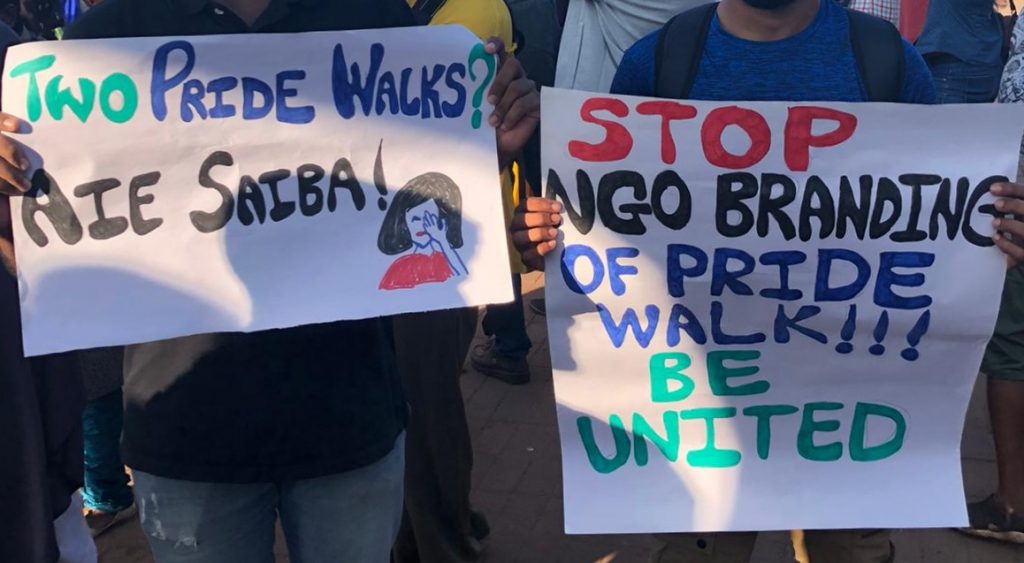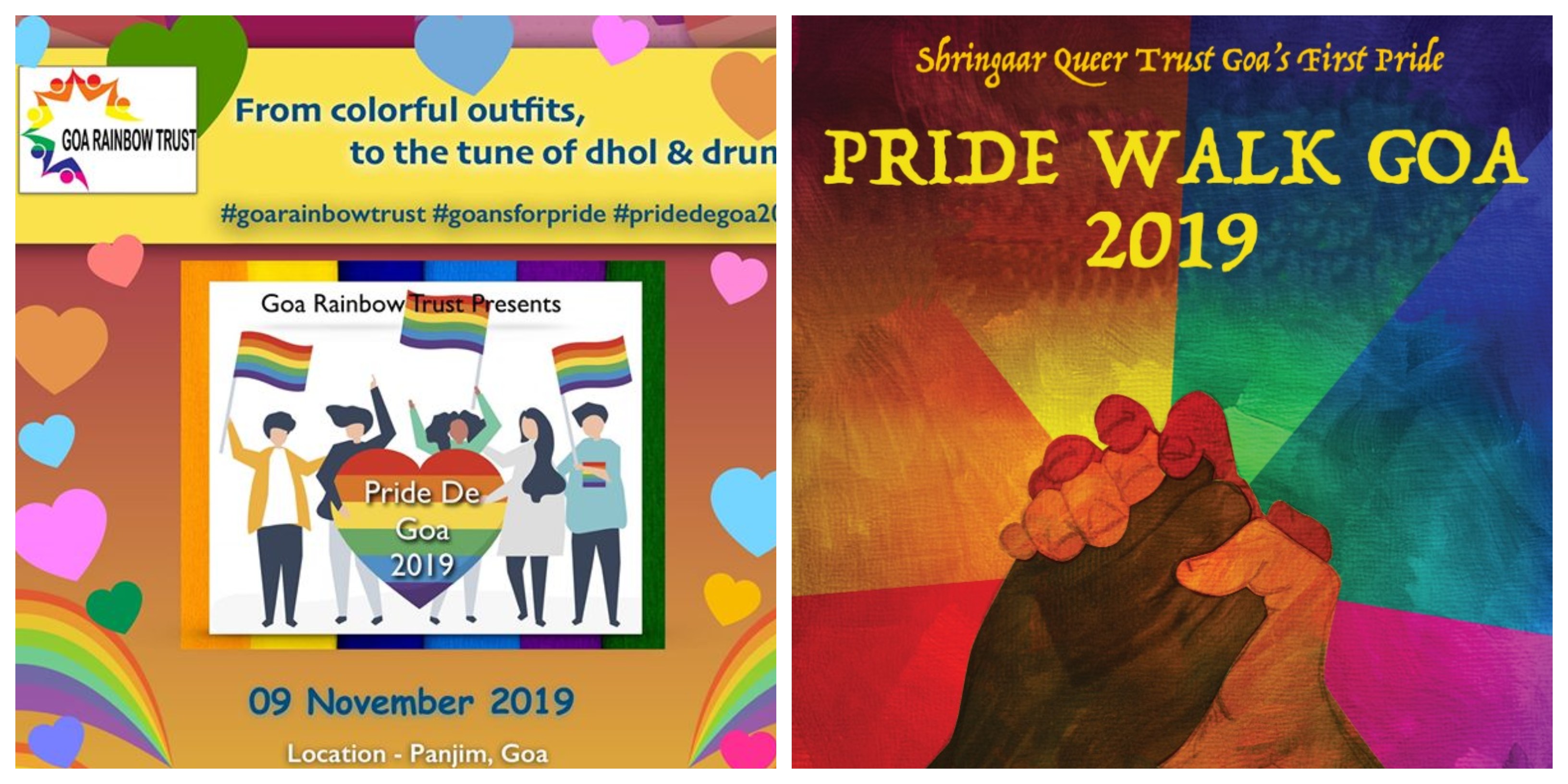A pride walk like a marriage has its share of drama, sacrifice and limelight. This is a personal perspective on Goa’s two pride parades in less than a month in the same city in Panaji, Goa, and along the same route. I would have loved to not recount some of these details, however I feel articulating these moments is essential in order to evolve as a collective and arrive at a better place as a ‘community.’ Not a community where everyone agrees. Hopefully one that collectively works together.
Each place has its own dynamics of the Lesbian, Gay, Bisexual, Transgender, Queer, Intersex, Asexual (LGBTQIA) people and organizations involved. The last year, 2018, had two separate contingents of walkers during the Pride Walk in Goa, demonstrating the rift between two factions. This year, it went on to another level of having two separate pride walks organized by two trusts, along the same route less than a month apart.
Any LGBTQIA person in Goa hoping to be part of any pride event becomes enmeshed within the tricky dynamics of the two trusts. Newer people get schooled into the history of older events and persons. Relationships turned bitter are relived through stories. For a new person hoping to be part of a ‘community,’ it gets tricky. This only sows seeds of discomfort, distrust and embarrassment, and eventually leads to ostracism. The events leading up to the pride walks witnessed people being removed from WhatsApp groups for having conversations on the other pride walk. There was tacit shaming and bullying as to which pride walk to attend or not. Some people eventually chose to attend both, or one of the two, or boycott both the pride walks.
Any LGBTQIA person in Goa hoping to be part of any pride event becomes enmeshed within the tricky dynamics of the two trusts.
Well an argument can be made that we could have as many pride walks as possible, one pride walk for each month or week. Let any NGO or person call for a pride walk as they/she/he want/s. However, what gets lost in the pursuit to organize a pride walk is its effect on the LGBTQIA people and allies in Goa as well as others outside the state who are not aware of the local dynamics. Should they support one pride over another or both or none? What are we conveying about our ability to form relationships for a common cause? Sometimes we seem to forget the underlying dynamics of the first group of queer people who protested against the authority of the state; the origins of the early pride marches; the radical and diverse voices among different groups within the pride walk.
The first pride walk on October 12, 2019, Sringaar Queer Pride, a self-funded pride, had a small attendance of approximately 20 people. It did seem like people wanted to join the pride, but decided not to, perhaps due to the low turnout. Though it was to end at the Miramar beach, it ended in a park, where the attendants chose to share stories of themselves and spoke about the possibility of having a single pride walk the following year.
The second pride walk on November 9, 2019, Pride de Goa, had a very good participation of approximately 100 people. It was a fun-filled event with a band of drummers and dancers. It ended with a Trust member thanking people on behalf of the Trust for coming and naming the “pride partners” who contributed to the pride walk (and were also represented in the pride banner). No mention of the words: Lesbian, Gay, Bisexual, Transgender, Queer, Intersex, Asexual and Allies was made. The onlookers on the beach had no idea what the parade was about. The organizers got their media bytes and that was how it ended.
What gets lost in the pursuit to organize a pride walk is its effect on the LGBTQIA people and allies in Goa as well as others outside the state who are not aware of the local dynamics
I carried a poster stating: “Stop NGO Branding of Pride Walk. Be United.” It was to voice out the difficult situation the LGBTQIA people and allies in Goa find themselves in and get a pulse of the pride from other people. Queer politics in the state should not be reduced to organizational feuds battling for media publicity and more funds. Perhaps, sitting together and making attempts at reconciliation may be one step towards resolving this conflict.

Questions We Need to Reflect on:
1. Why do NGOs/Trusts want to brand the Pride with the name of their organizations? 2. Why are LGBTQIA people and allies of Goa made to feel ashamed, guilty or rewarded for attending one pride over the other?3. Why is there an intolerance to differing points of view in matters relating to the LGBTQIA pride? 4. How can NGOs/Trusts find other ways of generating income other than organizing the pride and soliciting money from corporates and other partners? 5. Is the pride walk about individuals from a particular NGO/Trust who want to feel honored or credited for being the hosts of the pride?6. How do we deal with those who want to wield power and control?7. How do we give respect and recognition to others?
What We Hope for:
1. That Lesbian, Gay, Bisexual, Transgender, Queer, Intersex, Asexual and Allies come together to organize the pride walk in Goa through a non-registered group. In future, a pride committee be set up for all people who would like to be part of the organizing team. 2. All NGOs, Trusts, individuals keep aside their differences and work towards having a single pride walk. 3. No single NGO/Trust organizes the Goa LGBTQ pride walk in its name. The pride walk is symbolic of all the people of LGBTQIA and allies. 4. If any person wants to contribute towards the pride walk, they/she/he may do so. It is best to not encourage corporate funding as done in the second pride walk held this year.5. A separate fund can be made for all pride-related expenses and the account statement be made available post the pride celebration. 6. All the accounts of the Pride de Goa 2019 which collected funds from individuals and corporates (Pride Partners) for the LGBTQ Pride Walk be made available to anyone who wants to access it. There should be accountability of any money collected and spent in the name of a pride walk which in originality is a community event.
Hopefully, reflecting on these questions, articulating our needs, and working towards addressing them would collectively take us to a healthier space.

